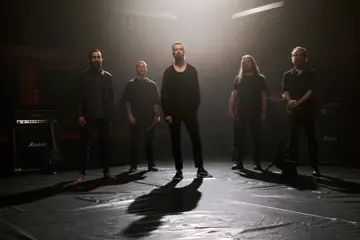The charm, intelligence, mischief and presence Peter Dinklage brings to his performances aren't limited to the stage and screen. Holding court in a Melbourne hotel suite, he gets in a few sly digs at the room's interior design, suggesting that Scarface drug lord Tony Montana may have had a say in the glitzy decor, before getting down to the serious business of promoting his latest film, the superhero blockbuster X-Men: Days Of Future Past.
While he is of course famous for his acclaimed, award-winning portrayal of wily, embattled nobleman Tyrion Lannister on the hit pay TV series Game Of Thrones, Dinklage has a diverse array of characters in a variety of genres to his credit. But Days Of Future Past, which marks director Bryan Singer's return to the franchise's helm for the first time since 2003's X-Men 2, sees the actor trying his hand at villainy, somewhat new territory for him.
That said, Dinklage's Dr Bolivar Trask isn't some madman plotting world domination and destruction from a mountaintop lair. Rather, he's a renowned scientist whose plan to wipe out the world's 'mutant' population – including our heroes, such as Hugh Jackman's clawed brawler Wolverine – with an army of weaponised robots named Sentinels has the endorsement of the world's superpowers: something that makes him all the more threatening... and more plausible, according to Dinklage.
“Usually with the villain role in superhero movies they operate on the fringes, just as the superheroes do,” he says. “They're considered a bit mad, but this guy is right there with the politicians, seated right next to the president, and he's a big influence. Because that happens quite consistently – we had a few of those running for president recently in America, and thank God they didn't get any closer – that's scary stuff. But nothing really gives away his villainy until you grasp what he's proposing, which is mass genocide.”
Don't miss a beat with our FREE daily newsletter
Perhaps more so than any other superhero saga, the X-Men movies have used their larger-than-life characters, conflicts and scenarios to reflect real world issues and concerns: prejudice, marginalisation and how fear of the unknown can manifest itself in hostility and violence.
“It's one of many reasons for their popularity,” says Dinklage. “These stories were written in a time when certainly America was finding itself – there were mini-revolutions taking place within its borders and then there were wars we shouldn't have been fighting outside our own borders, so it was a reaction to that. And it was done in a way these comic book writers knew how to do, by writing a comic book about it. They've always been relevant, and this one was at the forefront of that.”
What's more, the X-Men characters also represent anyone who has ever felt shunned or misunderstood, Dinklage believes. And that speaks to a great many people. “All of us have felt like an outsider to varying degrees – I can speak to that, being the size I am,” says Dinklage, who stands at 135cm.
“Mine is just more physically apparent than some 'mutations', but we're talking about anything physical, mental or emotional, anything to do with race, gender or sexual orientation. And especially in America, where these comic books were written, it was becoming more and more of an issue, and people – rightfully so – were becoming more brave about speaking their mind when it came to who they were, who they are.”
Pretty heady stuff for a comic book blockbuster, one might think. But Dinklage feels that superhero movies are now getting in line with their source material. “The core comic book fan has been waiting for this approach, I think,” he says. “And Bryan Singer's first X-Men movie was a pioneer of that.
“Sure, it's a summer blockbuster and it's full of superheroes and robots and crazy stuff that you don't see in everyday life, but then there are these intimate moments of character conflict that are so dramatic and gut-wrenching, and you rarely see that in these films,” he says. “Why not do that? Why not combine the elements? That's when you'll grab an audience. I don't want to know what I'm watching; I want to explore it and be surprised. Game Of Thrones does the same thing, and I think that's one of the reasons it engages people.”
Talking about the audience's shock at unexpected twists involving some of Game Of Thrones' most prominent characters, Dinklage says he was “surprised at how surprised people were”, but believes such a reaction stems from storytellers being unwilling to break the mould. “We don't challenge it enough,” he says. “We serve the same recipe over and over again because it tastes good and there's nothing wrong with it. But it can get a little boring after a while. Yes, it goes down easy but sometimes things should be spicier.”















